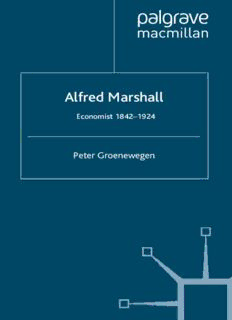
Alfred Marshall: Economist 1842–1924 PDF
Preview Alfred Marshall: Economist 1842–1924
Alfred Marshall Economist 1842–1924 Peter Groenewegen GreatThinkersinEconomicsSeries Series Editor: Professor A.P. Thirlwall, is Professor of Applied Economics, UniversityofKent,UK. GreatThinkersinEconomicsisdesignedtoilluminatetheeconomicsofsomeof thegreathistoricalandcontemporaryeconomistsbyexploringtheinteractions betweentheirlivesandwork,andtheeventssurroundingthem.Thebookswill bebriefandwritteninastylethatmakesthemnotonlyofinteresttoprofessional economists,butalsointelligibleforstudentsofeconomicsandtheinterestedlay person. Titlesinclude: WilliamJ.Barber GUNNARMYRDAL AnIntellectualBiography PaulDavidson JOHNMAYNARDKEYNES PeterD.Groenewegen ALFREDMARSHALL Forthcomingtitlesinclude: EsbenSlothAnderson JOSEPHA.SCHUMPETER ATheoryofSocialandEconomicEvolution MichaelSzenbergandLalRamrattan FRANCOMODIGLIANI AMindthatNeverRests CharlesRowley JAMESMCGILLBUCHANAN PoliticalEconomistandEconomicPhilosopher(1919–) MichaelA.Lebowitz KARLMARX JohnKing NICOLASKALDOR AlessandroRoncaglia PIEROSRAFFA JulioLopezandMichaëlSamuelAssous KALECKI’STHEORYOFCAPITALISTECONOMIES GerhardMichaelAmbrosi ARTHURC.PIGOU J.R.Stanfield JOHNKENNETHGALBRAITH WarrenYoung ROYHARROD G.C.Harcourt JOANROBINSONANDHERCIRCLE RogerMiddleton ROBERTSOLOW GreatThinkersinEconomics SeriesStandingOrderISBN978–14039–8555–2(Hardback) 978–14039–8556–9(Paperback) (outsideNorthAmericaonly) You can receive future titles in this series as they are published by placing a standingorder.Pleasecontactyourbookselleror,incaseofdifficulty,writetous attheaddressbelowwithyournameandaddress,thetitleoftheseriesandthe ISBNquotedabove. Customer Services Department, Macmillan Distribution Ltd, Houndmills, Basingstoke,HampshireRG216XS,England Alfred Marshall Economist 1842–1924 Peter Groenewegen EmeritusProfessorofEconomics,UniversityofSydney,Australia ©PeterGroenewegen2007 Softcover reprint of the hardcover 1st edition 2007 Allrightsreserved.Noreproduction,copyortransmissionofthis publicationmaybemadewithoutwrittenpermission. Noparagraphofthispublicationmaybereproduced,copiedortransmitted savewithwrittenpermissionorinaccordancewiththeprovisionsofthe Copyright,DesignsandPatentsAct1988,orunderthetermsofanylicence permittinglimitedcopyingissuedbytheCopyrightLicensingAgency, 90TottenhamCourtRoad,LondonW1T4LP. Anypersonwhodoesanyunauthorizedactinrelationtothispublication maybeliabletocriminalprosecutionandcivilclaimsfordamages. Theauthorhasassertedhisrighttobeidentified astheauthorofthisworkinaccordancewiththeCopyright, DesignsandPatentsAct1988. Firstpublished2007by PALGRAVEMACMILLAN Houndmills,Basingstoke,HampshireRG216XSand 175FifthAvenue,NewYork,N.Y.10010 Companiesandrepresentativesthroughouttheworld PALGRAVEMACMILLANistheglobalacademicimprintofthePalgrave MacmillandivisionofSt.Martin’sPress,LLCandofPalgraveMacmillanLtd. Macmillan(cid:2)isaregisteredtrademarkintheUnitedStates,UnitedKingdom andothercountries.PalgraveisaregisteredtrademarkintheEuropean Unionandothercountries. ISBN 978-1-349-54521-6 ISBN 978-0-230-59306-0 (eBook) DOI 10.1007/978-0-230-59306-0 Thisbookisprintedonpapersuitableforrecyclingandmadefromfully managedandsustainedforestsources.Logging,pulpingandmanufacturing processesareexpectedtoconformtotheenvironmentalregulationsofthe countryoforigin. AcataloguerecordforthisbookisavailablefromtheBritishLibrary. AcatalogrecordforthisbookisavailablefromtheLibraryofCongress. 10 9 8 7 6 5 4 3 2 1 16 15 14 13 12 11 10 09 08 07 Contents Preface viii 1 Introduction:AlfredMarshall,aGiantAmong Economists 1 1.1 Marshall’sworkasaneconomist 2 1.2 Marshall’sspecificcontributionstoeconomics 3 1.3 Marshall’smajorbooks 5 1.4 Marshall’sOfficialPapersandhistwo smallerbooks 10 1.5 Thebookinoutline 12 1.6 Marshall’sgreateminencedemonstrated 13 2 Family,ChildhoodandEducation(1842–65) 16 2.1 Childhoodandschool(1842–61) 18 2.2 Undergraduate at St John’s College, Cambridge (1861–65) 20 3 Marshall’sMoralSciencesApprenticeshipandSearchfor aNewVocation(1866–77) 28 3.1 MarshallatCliftonCollegeandasFellowat StJohn’s 31 3.2 MembershipofCambridgeclubsandgraduallossof faith 32 3.3 Philosophicalinquiryincludingfourphilosophical papers 34 3.4 Fromphilosophytoeconomics 36 3.5 AlfredMarshallandthePoliticalEconomyofJohn StuartMill 38 3.6 OtherearlyinfluencesonMarshall’seconomics 40 3.7 Earlyteachingandwritingineconomics 41 3.8 Travel,engagement,marriageanddeparturefrom Cambridge(1877) 47 v vi Contents 4 BristolandOxford(1877–84)andTwo‘Small’Books (1879) 49 4.1 PrincipalandProfessorofPoliticalEconomyatBristol UniversityCollege(1877–81,1882–83) 50 4.2 AyearinSicilyandEurope(1881–82) 52 4.3 EconomicsLectureratBalliolCollege,Oxford (1883–84) 53 4.4 Ashortbookforbeginners:TheEconomicsofIndustry (1879,1881) 55 4.5 Puretheoryofforeigntradeandofdomesticvalue (1879) 67 5 Professor at Cambridge (1885–1908) and Adviser to Governments 71 5.1 Thepresentpositionofeconomics(1885) 72 5.2 ProfessorialteachingatCambridge(1885–1908) 74 5.3 ThenatureofMarshall’sCambridgestudents 77 5.4 ThenewEconomicsandPoliticsTripos(1903)andits consequences 78 5.5 Givingadvicetogovernments 81 5.6 MemberoftheLabourCommission(1891–94) 90 6 WritingandRevisingthePrinciples(1882–1922) 94 6.1 PreparingthefirsteditionofthePrinciples(1880–90) 95 6.2 Thefirstedition(1890):contentsandreception 97 6.3 Adangerousinterruption:breakingtheflowwithan earlysecondedition(1891)andasummary,Elements oftheEconomicsofIndustry (1892) 102 6.4 Anindefinitelypostponedsecondvolume 103 6.5 ThefinaleditionsofthePrinciples,includingthe definitiveeighthedition(1920) 106 6.6 ThesignificanceofthePrinciples 111 7 PoliticalandSocialThought:‘AYouthfulTendencyto Socialism’;ChangingViewsontheWomen’sIssue;anda TasteforAdvocacyandOccasionalControversy 116 7.1 Marshall’spoliticalandsocialthought–anoverview 117 7.2 Atasteforoccasionallyinitiatingcontroversy:quarrels withCunningham,Böhm-BawerkandPearson 122 7.3 Housingpolicy,thepoor,poorlawreformandthe CharityOrganisationSociety 125 Contents vii 7.4 Member of learned economic societies and formationoftheBritishEconomicAssociation (laterRoyalEconomicSociety) 130 7.5 Marshall’sshiftingopinionontertiaryeducation (anddegrees)forwomenatCambridge 133 7.6 Concludingcomments 137 8 Retirement and Industry and Trade (1919): An ImportantCompanionVolumetothePrinciples 139 8.1 Retirementandfinallecture 141 8.2 Electing Marshall’s successor as Professor of PoliticalEconomy 143 8.3 Learning,writingandcontinuingcontactwith studentsandcolleagues 145 8.4 Aprincipledwareffort(1914–18) 147 8.5 Constructingthefirst‘companionvolume’tothe Principles 150 8.6 ContentsandreceptionofIndustryandTrade 152 8.7 Conclusion 160 9 FinalYearsandSomeFurtherVolumes(1919–24) 162 9.1 Thesageinoldage(1919–24) 163 9.2 Money,CreditandCommerce –writing,contentsand reception 168 9.3 Abookonprogressthatneverwas 173 9.4 Finaldaysanddeath(July1924) 179 9.5 Concludingremarks 183 10 ARichandEnduringLegacy 185 10.1 Ageneroustestatorydisposition 186 10.2 Asubstantialdoctrinallegacy 189 10.3 Directandindirect‘pupils’toformaCambridge School 193 10.4 Finalconcludingremarksonanenduringlegacy 199 Bibliography 201 ChronologicalBibliographyofMarshall’sWritings 204 Index 207 Preface This book on Marshall draws heavily on material contained in my biography of him published by Edward Elgar in 1995 under the title A Soaring Eagle. Alfred Marshall 1842–1924. Most of the biographical material in this study of Marshall as a major British economist derives from the research carried out for the earlier volume. However, the present book is not to be taken simply as a condensed version of the 1995 biography. Two features of the new work differentiate these products.ThefirstisthatthenewbookemphasisesMarshall’sworkasan economist to a far greater extent than the 1995 biography by carefully outlining Marshall’s economic ideas in considerable detail. Secondly, thenewbookisabletodrawonthetenyearsofnewMarshallresearch byagrowingnumberofMarshallscholars.Ofthese,thepublicationin 1996ofJohnWhitaker’sthreevolumeeditionofMarshall’scorrespond- ence is particularly noted, as is that of the Elgar Companion to Marshall publishedtenyearslaterin2006. As part of a series on Great Thinkers in Economics, the emphasis of thisbookhastobeonMarshalltheeconomist.Thisallowsnotonlyan overviewofthehostofimportantthingsMarshallsaidasaneconomist overthefivedecadesfromthelate1860swhichhedevotedtostudying economics but also gives an opportunity to appreciate the continuing relevanceofsomanycrucialaspectsofhiseconomics.Inshort,emphasis in the book is on Marshall’s economic method and ideas as developed by him over half a century in his various books and articles and on the manner in which these were passed on to the many pupils whom he had taught himself, who then in turn passed it on to their pupils. Thebook,therefore,alsohassomethingtosayontheeconomicschool Marshall created by not only presenting major aspects of the nature of Marshall’s economics, but also by addressing the manner in which it wasgraduallydiffusedovervariouspartsoftheworld. OnefurthercomparativecommentcanbemadeonthisMarshallbook andits1995predecessor.Inthisbook,footnoteshavebeencompletely, anddeliberately,avoided.Allreferencesareprovidedinthetextbythe Harvardmethod. Thisprefacealsoprovidesanopportunitytothankthegeneraleditor oftheseries,TonyThirlwall,forhiscarefulcopy-editingofthefirstdraft, tothebenefitofmystyleandsomeoftheothercontentsaswell. viii Preface ix Itishopedthatthisbookwillbeofinterestnotonlytohistoriansof economicsbutthatitwillbereadespeciallybyMarshall’strueheirs,the currentpractitionersofeconomicswhowishtolearnmoreabouttheir subject’s origins and about a person who shaped its foundations. They maythenalsolearnthateconomicsevenifoveracenturyold,asisthe case of most of Marshall’s economics, may still have important things toteachtocontemporarypractitioners.Ifthisbookencouragesreaders togobacktoMarshall’sworks,andtherebylearnmoretoappreciatehis manycontributions,Iwillbemorethanwellpleasedasitsauthor. Sydney,May2007
